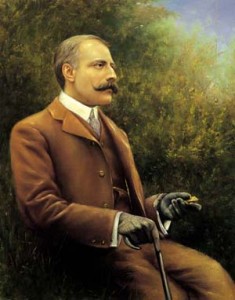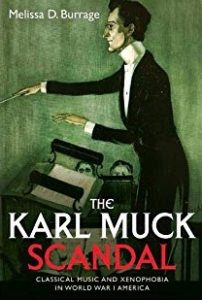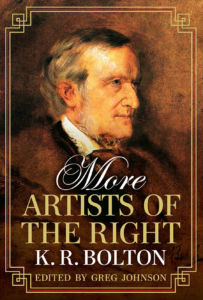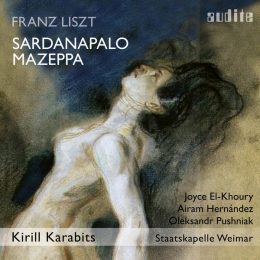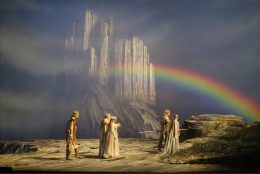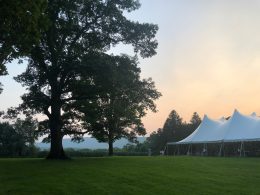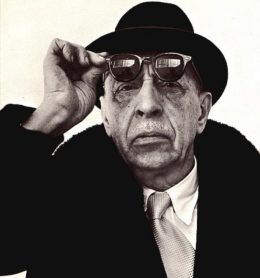Tag: classical music
-
December 5, 2019 Greg Johnson
Evropan Edward Elgar
-
Melissa D. Burrage
The Karl Muck Scandal: Classical Music & Xenophobia in World War I
Rochester, N.Y.: University of Rochester Press, 2019This year saw the publication of a curious little history about a curious little event from the First World War. Karl Muck is a name that might not be on the lips of many people these days. (more…)
-
Richard Wagner was born 206 years ago today in Leipzig in the Kingdom of Saxony. He died on February 13, 1883 in Venice. As an artist, intellectual, author, and cultural force, Wagner has left an immense metapolitical legacy, which is being evaluated and appropriated in the North American New Right. I wish to draw your attention to the following writings which have been published at Counter-Currents/North American New Right. (more…)
-
Franz Liszt
Liszt: Sardanapalo & Mazeppa
Staatskapelle Weimar, conducted by Kirill Karabits
Audite, 2019Franz Liszt began composing an opera to an Italian libretto based on Byron’s tragedy Sardanapalus in 1849. (more…)
-
Richard Wagner (1813-1883) was the most influential composer of the nineteenth century and one of the most influential composers in the history of Western art music. (more…)
-
January 17, 2019 Theberton
Video of the Day
Wagner & Great Arttime: 4:35
-
843 words
Last week was a very bad week for the globalists. First, Jair Bolsonaro won the Brazilian presidency in a landslide; then, Angela Merkel was forced to resign the chairmanship of the Christian Democratic Union after her party received another drubbing in regional elections. (more…)
-

Parsifal and Gurnemanz travelling through German history and entering the Grail Hall in Hans-Jürgen Syberberg’s film of Parsifal – a truly outstanding presentation of the drama.
6,800 words / 39:17
To listen in a player, click here. To download the mp3, right-click here and choose “save link as” or “save target as.” To subscribe to the CC podcast RSS feed, click here.
For a Wagnerian, seeing a performance at the Bayreuth Festspielhaus (Festival House) – the theater that was built and established by Richard Wagner himself, with the financial support of Wagner Societies across Germany as well as King Ludwig II and the Bavarian state coffers in the 1870s – is the Holy Grail of Wagnerism, the pinnacle of the Wagner experience. (more…)
-
Berkshire County in Massachusetts consists of the westernmost nine percent of the state that played such an illustrious role in the founding of our nation. Today, that county illustrates the irony confounding much of our nation: that we hear the loudest yelps for diversity among those who live in almost entirely white areas. (more…)
-
Frederic Spotts
Hitler and the Power of Aesthetics
New York: The Overlook Press, 2003Leaders throughout history have frequently deployed the arts as a means by which to display their power. Hitler is unusual, however, in that art was central to his political vision. He was intensely interested in the arts (painting, sculpture, music, and architecture) and dreamed of forging a state whose artistic and cultural achievements would rival those of ancient Greece and Rome. (more…)
-
Igor Stravinsky is justly regarded as one of the giants of twentieth-century music. His influence upon contemporary music has been enormous; composers influenced by him include Carl Orff, John Tavener, Aaron Copland, Edgard Varèse, Frank Zappa, and others. He is best known for his three ballets: The Firebird, Petrushka, and The Rite of Spring, (more…)
-
Richard Wagner was born 205 years ago today in Leipzig in the Kingdom of Saxony. He died on February 13, 1883 in Venice. As an artist, intellectual, author, and cultural force, Wagner has left an immense metapolitical legacy, which is being evaluated and appropriated in the North American New Right. I wish to draw your attention to the following writings which have been published at Counter-Currents/North American New Right. (more…)
-
1,693 words
Hans Pfitzner
Palestrina
Symphonieorchester des Bayerischen Rundfunks, conducted by Rafael Kubelík
Deutsche Grammophon, 1989Hans Pfitzner’s Palestrina is one of the unsung masterpieces of twentieth-century opera. (more…)
